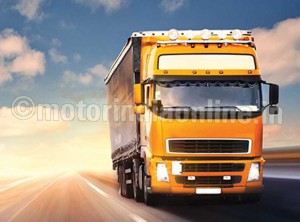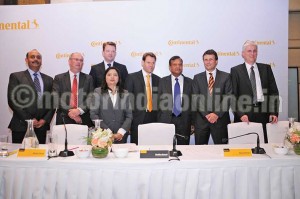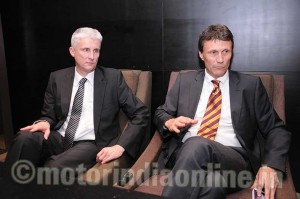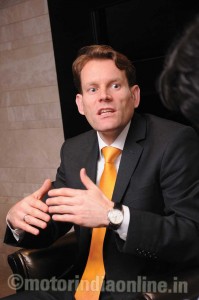 The Indian truck tyre replacement market has a volume of approximately 14 million units per year, of which almost four million units are radial tyres and others bias tyres. Over the last five years, the market has not only grown by approximately 24 per cent, but has also seen a strong shift towards radial tyres. It is expected that radialisation will gain further momentum in the next few years.
The Indian truck tyre replacement market has a volume of approximately 14 million units per year, of which almost four million units are radial tyres and others bias tyres. Over the last five years, the market has not only grown by approximately 24 per cent, but has also seen a strong shift towards radial tyres. It is expected that radialisation will gain further momentum in the next few years.
Discerning such an unprecedented penetration of non-bias tyres in the commercial vehicle segment, German tyre maker Continental is gearing up to tap the trucks and buses radial tyre market in India with the commencement of local production at its plant at Modipuram in Meerut. The announcement comes nearly three years after the Hannover-based firm had acquired Modi Tyres Company for around Rs. 117 crores. As per the initial plan, the European firm has invested 50 million Euro on the Modipuram facility since 2011 to enhance its capabilities to churn out radial tyres. Further investments will be made in the subsequent phases.
“With the launch of truck and bus radial tyres, we have completed our product portfolio in India and now we can grow our business here with premium solutions,” Continental Head of Tire Division, Mr. Nikolai Setzer, told reporters while making an announcement. “The first phase of consolidation in the country, which began in 2011, is now complete”, he added.
The company’s Modipuram facility in Uttar Pradesh has an annual production capacity of 1.1 million bias tyres for trucks and buses. It has now added capacity to manufacture 2.2 lakh trucks and buses radial tyres annually at the plant.
With an initial annual production capacity of 220,000 radial truck tyres, a dealer network of more than 1,400 outlets, and sales & customer service teams in more than 70 cities across the country, Continental takes the next step in expanding its reach in India after acquiring the home-grown tyre manufacturer. The company is also looking to expand its product offering in the passenger vehicle radial tyre segment, apart from entering into the construction equipment tyre category.

“Introducing Continental radial truck tyres into the Indian market is a momentous occasion for us. India is the second largest market for truck tyres in the Asia-Pacific region (APAC), and we strongly believe that our premium technology products, manufactured locally and distributed through our Indian market organization, will make Continental a preferred partner in the tyre replacement and original equipment business,” states Dr. Andreas Esser, Head of the Commercial Vehicle Tires business at Continental.
Investing in local production capacities is part of Continental’s strategy to diversify its global manufacturing footprint and expand business in growing markets, such as India. Continental has invested heavily into the construction of a new production building alongside with machinery for making radial tyres. Furthermore, Continental brought experienced staff from some of its other international production sites to India in order to train local staff on the new machinery and production techniques. Also, more than 100 local employees were sent abroad to the international production sites in Germany, Romania, China and Malaysia for comprehensive training in radial tyre production and technology.
“We firmly believe that the personal training of our local staff through experienced experts from other production sites is a key factor for the successful ramp-up of a new tyre plant. The strong manufacturing network supports excellence in operation, especially in the case of the switch from producing bias tyres to radial tyres where the technology involved is more complex and requires additional know-how,” remarks Mr. Thierry Wipff, Head of Manufacturing Commercial Vehicle Tyres at Continental.
Continental’s initial radial tyre product portfolio for India covers the Goods, People and Construction segments. In the Goods segment, the HSR2 steer tyre and the HDR2 drive tyre offer high reliability and mileage. For the People segment, Continental launched a dedicated coach tyre, which stands out through its smooth ride, excellent mileage and directional stability. The high-tech construction tyres HSX2 and HDX2 round off the product portfolio with their excellent durability and strong off-road performance.
As one of the world’s leading tyre manufacturers, with more than 42,000 employees, Continental’s Tyre Division achieved sales of €9.7 billion in 2012. Today, the division has 22 production and development locations worldwide. The broad product range and continuous investments in R&D make a major contribution to cost-effective and ecologically efficient mobility. The company’s Commercial Vehicle Tyre business is one of the largest manufacturers of truck, bus and commercial specialty tyres worldwide.
Interview with Dr. Andreas Esser, EVP-Business Unit CVT and Member of the Board, Tire Division, Continental AG, (left), and Mr. Benoit H. Henry, EVP- Business Region Asia-Pacific Truck Tire and CEO-Continental Tyre Malaysia Sdn Bhd.
How important will be the Indian market be for you, particularly in the CV space?

Dr. Andreas Esser (AE): From a global standpoint, it is obviously a very important market. It is a huge market for us since the transportation segment is witnessing a boom, and demand for radial tyres is also increasing. India is one of the largest countries in terms of postulation. Going forward, we see a lot of potential in the country.
Mr. Benoit H. Henry (BH): In the Asia Pacific region, India is one of the biggest markets when it comes to market potential. We are now pretty active with a manufacturing facility here. Furthermore, India is occupying 65 per cent of my attention. That is even bigger than China.
How different are your newly-launched products from those of your competitors which are already available in the market?
AE: Basically, we are bringing some answers to the radial products. We are capable of serving the 95 per cent of the needs of the Indian economy. We have launched the products with different patterns for different axles and applications. So we are really not starting with a radial offering in India. We are coming with almost a complete portfolio of products (in the tyre space).
So will there be a further ramp-up in capacity at your Modipuram unit?
AE: We have the capacity to roll out one million tyres there, and we have recently ramped it up to produce over 200,000 tyres per annum. Depending on the market condition, we will decide on further enhancement.
Will these tyres be shipped out to other markets too?
BH: No, the tyres that we have launched are tailor-made for the Indian market. We cannot consider exporting them to other countries in the future. However, we might consider Bangladesh as the next destination for export. But we are not sure whether they will be sent to Taiwan or Malaysia.
Do you have an in-house R&D unit in India?
AE: Yes, we are running an in-house R&D unit at our Modipuram unit. It commenced operations nearly an year ago and we continue developing capabilities there.
How far is radialisation catching up in India and how quickly do you expect it to replace bias tyres?
AE: Frankly speaking, radialisation is not as fast as it should be from our point of view because we are experts in radial tyres rather than bias tyres. In countries like China, it has picked up pretty quickly. There it was more of a directive from the Government to go in this direction. But in a democratic country like India, it takes a little more time.
Answering the second part of your question, the advantage of radialisation is that it delivers a higher fuel efficiency. But bias tyres are suitable when it comes to stability of the sidewall (of a tyre). So, with the development of the country’s infrastructure, there will be a natural inclination towards radial tyres in the future.
How do you compare the Indian market with other markets around the globe?
AE: We are developing our products according to the infrastructure provided in a country. Obviously, there are more highways in the US and European countries. So we adapt our tyres to meet those highway conditions. In India, we need more robust tyres due to the (not-so-good) quality of the roads here. That’s where the major difference is. Another key difference is that in Europe or America, people buy a tyre which delivers higher fuel efficiency. So it is a very sophisticated approach as compared to India.
Interview with Mr. Nikolai Setzer, Member of the Board, Tire Division, Continental AG
You have invested 50 million Euro in the Indian market for your new radial tyre assembly line at Modipuram. Will you be making a fresh outlay in the subsequent phases? And what about your long-term plans for the Indian market?

Besides the acquisition (at around Rs. 117 crores) two years back, we have already invested around 50 million Euro on the Modipuram facility to attune it to produce radial tyres. We have brought in new equipment and installed advanced machinery. With this, the first phase of consolidation has been completed. We have to ensure that our full range of premium products that we are selling now meet our customers’ needs. Once we utilize the capacity, we will go for our next phase of investment. We are now producing more than a million bias tyres for trucks and buses (through the inorganic route) and have now diversified into production of radial tyres (through the organic route). Today we are just celebrating the start of the new era (of TBR).
So would you be focusing more on the aftermarket than OEMs?
I would say both the verticals are important for us. We started investing for the aftermarket. But these new range of products will be catering to both the verticals.
What are your plans on expanding the network to further enhance your presence?
We are already present through a chain of 1,400 dealers in the 70-odd cities in the country. So when we took over Modi Tyres in 2011, we made sure that we not only acquire the plants but also ally with the existing dealer network which we can now utilize to further our distribution plans. Going forward, we not only have plans to increase the number of outlets but also professionalizing and improving our network.
Who would be your target customers in the aftermarket vertical?
We are running both small size and medium size dealers. They are servicing their customers. But we are obviously targeting large fleet operators. In the past, we just had bias tyres and could not get business from premium customers because they were gravitating to radial tyres. But now we can sell our products to them. To put it the other way, our dealers are like a one-stop shop and the customers can buy the products that will suit their needs.
Have you been approved by any OEM to deliver your radials directly to their plants?
Currently, we are not supplying to any OEMs. This will happen in the next one or two years when we will be holding discussions with them to source our premium products. But this is the practice that we follow in other countries too.
What impact will your products have on the cost of ownership and fuel efficiency?
It depends on how you use it. If you use it straight on the streets where radial tyres have the higher performance, you can easily talk about a lower rolling resistance of 15 to 20 per cent (of the tyres). But if you go to the rural side, then other factors play a big role and you don’t get the full advantage. Then you might get a lower mileage.
Lastly, the Indian CV radial tyre market is becoming increasingly competitive with the entry of global brands in addition to existing well-entrenched Indian players. How much of a challenge will that be for you?
Continental is a multinational giant that tackles different sets of challenges in different markets. In India, our strength would be that we would be offering a premium product that delivers a higher mileage at a competitive price. We are entering the high-end segment by propagating our global technology strength and superior brand image.